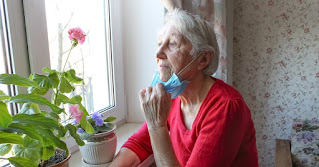The COVID-19 pandemic is still spreading largely unchecked through many parts of the world, leading businesses to close their doors to the public and healthcare facilities like nursing homes to keep visitors from entering so as not to infect the elderly and those with weakened immune systems. But somehow, seniors living in these facilities have still been contracting the novel coronavirus. There have been reports of the virus spreading through entire nursing homes and veterans’ homes, infecting dozens of patients and killing many of them.
The Veterans Community Living Center at Fitzsimons in Aurora, Colorado, is a good example. The facility is home to 137 elderly veterans. So far, a total of 42 of these veterans have tested positive for coronavirus, along with 14 staff members, and nine have passed away. All this despite the home’s strict no-visitor policy, cleaning protocols, and other safety precautions that have been implemented.
We’ve been so careful to protect some of the most vulnerable among us. Why isn’t it working?
Well, part of the problem, of course, lies in the fact that elderly people living in nursing homes, assisted living facilities, and veterans’ homes are in need of assistance on at least a daily basis, so they cannot be completely contact-free. Many of them are not allowed to see their families and friends, but they still see their nurses, doctors, and caregivers regularly. Of course, these healthcare workers are generally very careful to wear proper personal protective equipment to avoid catching or spreading the virus, but these safety measures are not entirely foolproof.
The patients themselves are also supposed to wear masks to help curb the spread of the virus, but this presents a few challenges. There are some elderly people who cannot wear masks due to health conditions and others who simply don’t see the point in wearing a mask and refuse to do so.
And of course, there are also those who suffer from Alzheimer’s and dementia. They often have a hard time comprehending why they have to wear a mask, and even if they agree to do so, they may not be able to remember to do so. If caregivers put masks on them, they’re very likely to touch their faces or remove their masks without thinking. This inability to remember proper mask protocol throws a wrench in the plan to avoid spreading COVID-19.
“Helping those folks to wear masks and to continue to wear masks or to social distance is difficult because, you know, a few minutes after you work with them to get a mask on, they then don’t realize why they have a mask on and take it off—or the same thing goes for social distancing,” says May.
But masks are just the tip of the iceberg. An Alzheimer’s or dementia patient who cannot remember to wear a mask and stop touching their face is also unlikely to remember other proper hygiene rules, like washing their hands for 20 seconds on a regular basis. In many cases, patients’ hygiene is overseen by healthcare workers, and in ordinary times, this is enough to keep patients healthy. But in the time of COVID-19, when staff members are overworked, protective gear is scarce, and the coronavirus is highly contagious, extra hygienic practices must be in place to keep everyone safe. And for a person with dementia, it can be nearly impossible to understand that concept and put it into practice.
COVID-19 rules in general have been difficult for seniors, who already suffer from loneliness and boredom. They haven’t been able to dine in common areas, have visitors, or get out of their rooms. Staff members try to visit more often and spend some time with them, but they have to do so while wearing protective equipment, which can be hard for residents to deal with, and many times they don’t have extra time to spend with their residents. All of this is putting extra strain on healthcare workers and residents of senior living facilities during the pandemic and stay-home orders.
For now, we’re all doing the best we can to keep elderly people safe and well during this difficult time, and healthcare staff is working around the clock to come up with new and innovative ideas to improve residents’ health and safety. We’re all in this together.




